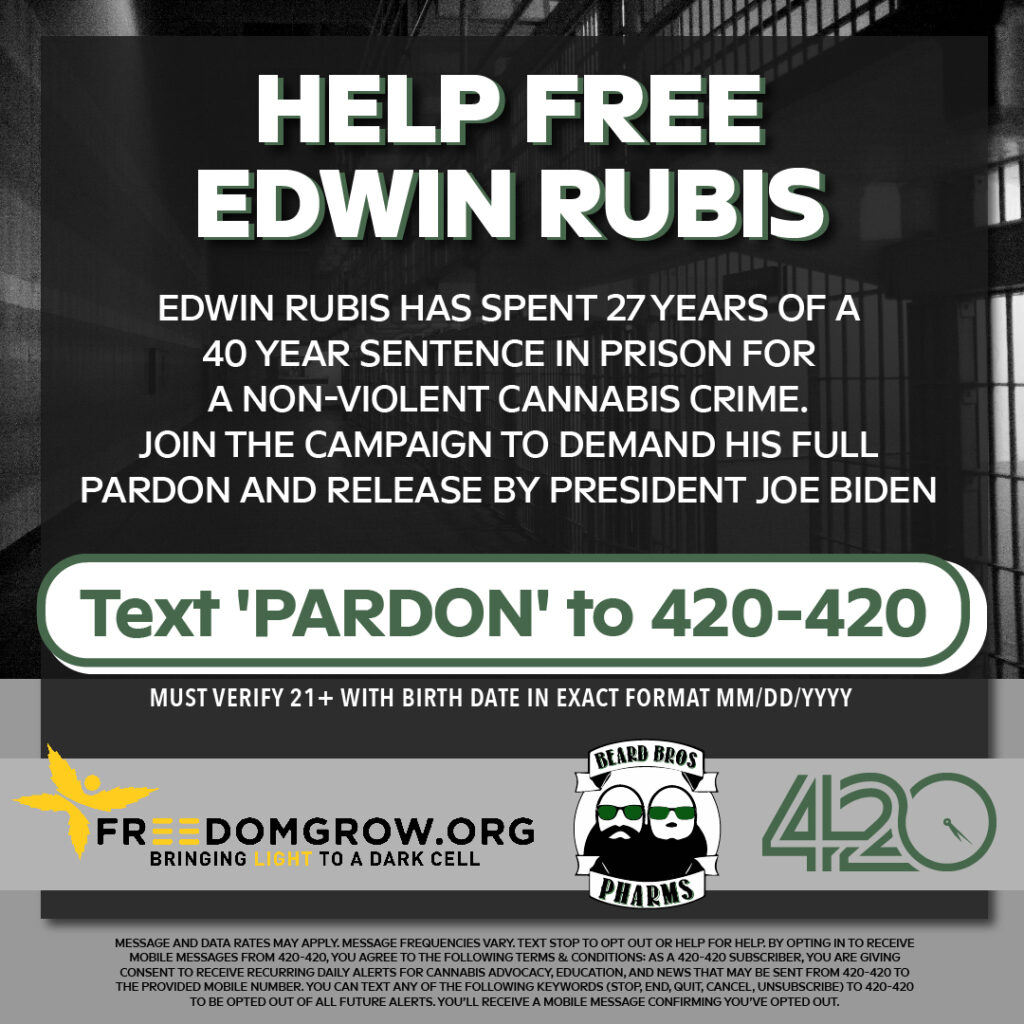In a nation where the vast majority of the states have legalized cannabis to some degree, there are still people serving time for nonviolent cannabis convictions.
A Call for Justice: The Case of Edwin Rubis
As the U.S. legal cannabis industry is projected to surpass $100 billion in annual sales, the case of Edwin Rubis remains a glaring reminder of the injustices rooted in the War on Drugs. Rubis, now 56, is serving a 40-year sentence in federal prison for a non-violent cannabis offense committed in the late 1990s. After 27 years behind bars, advocates are calling on President Joe Biden to grant him a full pardon and release him.
Rubis’ situation is especially troubling in light of the current legal status of cannabis in many states, where it has not only been decriminalized but also commercialized and celebrated. Beard Bros Pharms, a respected legacy cannabis brand and media outlet, has taken a leading role in advocating for Rubis’ release, amplifying his story and calling for broader criminal justice reforms.
— Text PARDON to 420-420 to be involved with this advocacy effort. —
— You can sign the petition to pardon Edwin here. —
— You can donate to support Edwin’s fight for freedom here. —
With the support of Farechild Events, a call to action was made at this year’s annual Emjay Awards in association with the world’s largest cannabis business conference, MJBizCon.
Call to action at the Emjay awards during #mjbizcon2024
— 420-420 (@textVIPto420420) December 23, 2024
Text PARDON to 420-420 to help @FreeRubis pic.twitter.com/D88qHLLvS9
Time for President Joe Biden to Grant a Pardon
The case of Edwin Rubis is a clear example of the hypocrisy that still plagues federal cannabis policy. Despite state-level legalization and a booming cannabis industry, people like Rubis remain imprisoned for non-violent crimes that, in today’s world, would not even be considered a criminal offense.
President Biden has a unique opportunity to right this wrong. His administration has made promises to address the inequities of the War on Drugs, and advocates believe that granting clemency to individuals like Rubis would be a powerful step toward fulfilling that commitment.
With Beard Bros Pharms and Freedom Grow leading the charge, the pressure is mounting on the Biden administration to take meaningful action. The cannabis community and social justice advocates are watching closely, hoping that Rubis’ nearly three-decade ordeal will soon come to an end. For Rubis, and countless others still imprisoned for non-violent cannabis offenses, clemency is not just a plea for compassion—it is a demand for justice.
After the call to action at this year’s Emjay Awards in association with MJBizCon 2024, the time is now to join the effort and call for a presidential pardon.
This recent Q&A with Edwin was published with permission from Beard Brothers Pharms, who have been leading this advocacy effort ongoing…
Q: How long have you been in prison? And how much time you have left to serve?
Edwin Rubis: I am on the 27th year of my imprisonment. My outdate is 2031. I’ve got about six more years to go. I came to prison when I was 29 years old, I’ll be 62 when I get out. Crazy huh?
Q: When were you arrested?
Edwin Rubis: The morning of May 27, 1998. A normal day. I was going to work. Late. But I was going.
Q: Where were you arrested, and who arrested you?
Edwin: I was arrested in Houston, Texas, by the D.E.A. and the Texas Gulf Coast Task Force. They were heavily armed. I thought they were coming to arrest a serial killer or a terrorist. They ransacked the apartment. Strip searched my wife and my three year old son. They did not find any drugs, money, or guns.
Q: What were the charges?
Edwin Rubis: I was indicted for conspiracy to distribute marijuana.
Q: Were you guilty of those charges?
Edwin Rubis: I was guilty of transporting and selling weed. But not in the amount mentioned in the federal indictment.
Q: How did you become involved in the conspiracy?
Edwin Rubis: I didn’t. You have to understand what conspiracy is. Federal law is not like state law. Federal courts can use hearsay testimony to establish guilt due to a conspiracy charge. Two or three people can say: “Mike told me Edwin said it was okay to sell weed”, and it’s considered credible testimony to find a defendant guilty of conspiracy. Conspiracy itself is a uniquely American Federal charge.
Q: Is that what happened to you?
Edwin Rubis: Of course. Five of my co-defendants [and others], including the leader of the conspiracy, testified against me in open court, saying “so and so said Edwin was involved and present during cannabis purchases and sales”.
Q: Were there any victims in the case?
Edwin Rubis: No. The only victim, if we are going to concede that there is indeed one, was myself and my family.
Q: Why 40 years? Why such a harsh punishment?
Edwin Rubis: Simple. 97% of federal charges are resolved through a guilty plea and some form of cooperation [snitching] to further investigations on other people involved in criminal activity. The other 3% go to trial. I exercised my constitutional right under the Sixth Amendment (a trial by a jury of my peers). I was heavily penalized for taking the case to trial, resulting in an enhancement by the government and the court. The system is designed this way. The prosecutors want federal defendants to plead guilty and snitch on others. They frown on people going to trial.
Q: Why didn’t you plead guilty then?
Edwin Rubis: I couldn’t. I wasn’t going to put my family in danger for snitching. Besides, my court-appointed attorney said I could only plead guilty by telling on others in the drug trade.
Q: What about your family, how have they dealt with your incarceration?
Edwin Rubis: They haven’t. I don’t think anyone can deal with a family member taken away for 40 years. It is traumatic all the way around. I lost my wife. I’ve never met my oldest son in person. My youngest son, Austin, suffers from a mental illness. My mother and father are in their eighties now, and have serious medical issues. I can’t be there for any of them. The most difficult part is when your family needs you and you’re locked up in a cage, year after year.
Q: Can you seek clemency from the president or other form of legal actions to reduce your sentence?
Edwin Rubis: Been there. Done that. I’ve had numerous legal motions and appeals denied. I’ve applied for clemency from the last three Presidents. I have always received the same response, “We cannot grant you a reprieve at this time.”
Q: Do you have a clemency petition before President Biden?
Edwin Rubis: Yes. It’s been pending for four years, and he’s about to leave office. I might be left behind, by yet another President. It’s happened in the past (Bush, Obama, and Trump).
Trending
Compassion Never Left California Cannabis, In Fact it is Stronger Than Ever
Q: How could anyone help you at this time?
Edwin Rubis: The only thing left to do, is to continue to help me raise funds for a new, diversified legal campaign. I need an attorney who specializes in post-conviction law. We need nationwide ads designed to create exposure with my case. I’m also in need of a private investigator to interview members of the jury who served during my trial. The jury at the time had instructions to find me guilty of a “detectable” amount of marijuana, which could imply as little as a single joint. They were completely unaware the judge would later sentence me to 40 years. If they would have known, I believe they would’ve acquitted me.
Q: Does your family have something set up where people can help with funds?
Edwin Rubis: Yes. This is the link to my family’s fundraiser: tinyurl.com/FreeEdwinRubis
Many people have been contributing already. I am grateful for this.
Q: Are there any organizations that are helping with your situation?
Edwin Rubis: Yes. FreedomGrow, the WeldonAngelos Project, Mission Green, LPP, 40-tons, BeardBrothers, amongst many others. Also, there are numerous individuals who tirelessly advocate for my situation [too many to name here]. They all say the same thing. My case needs nationwide exposure, and for that to happen we need FUNDING.
Q: How have you spent your time in prison? What do you do on a daily basis?
Edwin Rubis: When I first came to prison, I was devastated. I was depressed and on the verge of attempting suicide. Faith is what eventually helped me to overcome depression and to help me cope with the separation from my family. It enabled me to seek rehabilitation from self-destructive behavior(s). Over the years I’ve completed over 30 rehabilitation program(s). I have earned three college degrees, and published a book to help others cope with their own life issues and mishaps.
Everyday I look to better myself mentally, and physically. I exercise. I write. I read. I study. I pray. Through all of this, I try to lift up others in the process.
Q: What would make your life better in prison?
Edwin Rubis: That’s a good question. I don’t think anything would make my prison time better. Maybe if I had access to better food and educational tools, that would, at least, make it somewhat more bearable.
Q: What are your dreams and goals for when you get out?
Edwin Rubis: For 27 years I’ve been preparing myself and will continue to do so. I want to be a better version of myself than when I first came into the system. I would like to author self-help books, and teach others what I’ve learned. I want to establish a non-profit organization to promote empathy in the world – despite race, religion, creed, culture, and so on.
Q: Do you have some final words?
Edwin Rubis: I do. I hope I am interviewed more in the future. I have so much more to say about the war on drugs, jury nullification, my trial, the 13th Amendment, politics, and legalization of cannabis.
Edwin Rubis’ story is a sobering reminder of the deep injustices within the U.S. legal system, especially when it comes to the war on drugs. His 40-year sentence for a nonviolent cannabis offense starkly contrasts with today’s legal landscape, where cannabis is now a multi-billion-dollar industry in numerous states. Through his responses, Edwin reveals the harsh realities of conspiracy charges, the trauma inflicted on his family, and the systemic penalties imposed on those who choose to exercise their constitutional right to a trial. Despite these hardships, his resilience shines through as he continues to seek justice, advocate for reform, and prepare himself for a brighter future outside prison walls.
This Q&A serves as both a call to action and a plea for support. Edwin’s fight for freedom hinges on raising awareness, funding a robust legal campaign, and securing clemency before time runs out. It’s a chance for all of us—advocates, organizations, and individuals—to rally behind a cause that represents the larger fight for justice in the cannabis industry. Edwin’s unwavering hope and commitment to personal growth remind us that change is possible, but only if we remain united in demanding it. By amplifying his voice, we can help turn the tide toward justice for Edwin and countless others like him.
Edwin has a book for sale now as well.
Beard Bros Pharms Leads the Advocacy Charge
Beard Bros Pharms has long been at the forefront of the cannabis legalization movement, but their commitment to criminal justice reform runs just as deep. Through their extensive media channels, they have shed light on Rubis’ case, helping to mobilize public and industry support for his release. As a brand known for its integrity and advocacy, Beard Bros Pharms has taken up the mantle of pushing for meaningful action from the Biden administration.
In a recent statement, the founders of Beard Bros Pharms called Rubis’ continued incarceration a “national disgrace,” particularly given the legal landscape today. “How can we continue to grow a legal industry while people like Edwin Rubis remain imprisoned for a plant that’s generating billions in profits? This injustice must be corrected,” they stated.
Beard Bros Pharms has rallied the cannabis community and beyond, calling for President Biden to fulfill his campaign promises of addressing the harm caused by outdated cannabis laws. While Biden’s recent pardons of individuals convicted of simple possession have been a step in the right direction, advocates argue this is far from enough. Rubis, who was a first-time, non-violent offender, is emblematic of a broken system that continues to fail those disproportionately affected by cannabis prohibition.
Freedom Grow: Helping Cannabis Prisoners Reclaim Their Lives
Adding to the groundswell of support for Rubis is Freedom Grow, an all-volunteer, non-profit 501(c)(3) organization that is dedicated to helping cannabis prisoners regain their freedom. Freedom Grow works tirelessly to support incarcerated individuals and their families, providing commissary funds and advocating for clemency. The organization has also taken up Rubis’ case, joining forces with Beard Bros Pharms to raise awareness and call for action.
Freedom Grow plays a crucial role in bridging the gap between those who have been unjustly imprisoned and the growing cannabis community that is benefiting from legalization. Their work highlights the stark contrast between those who have prospered in the legal market and those who continue to suffer behind bars for non-violent offenses.
Edwin Rubis and others like him have served far too much time for something that is now a legitimate business. President Biden has the power to correct this, and we urge him to do so.




